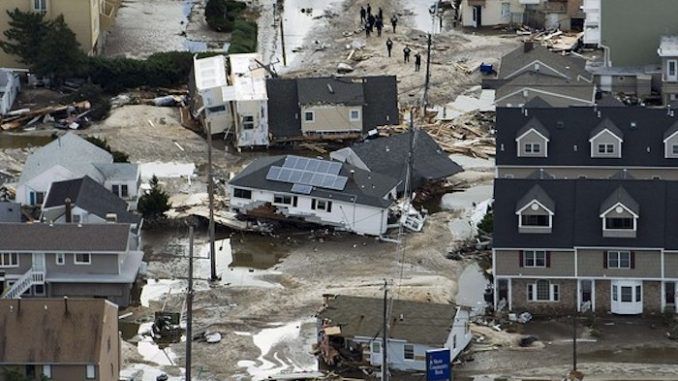
Officials in Florida have banned residents from using solar panels, as 371,000 people are still without electricity following the impact of hurricane Irma.
Many Florida Power and Light’s grid customers who are living through dangerous heat without power now have solar panels on their roofs that could keep them going while FPL repairs its infrastructure. However, doing so has been made illegal, thanks to FPL’s lobbyists, who ghost-wrote Florida’s strict solar rules.
Libertyblitzkrieg.com reports: Here’s some of what we learned about this situation from a fascinating article published by the Miami New Times, Why Didn’t FPL Do More to Prepare for Irma?

BYPASS THE CENSORS
Sign up to get unfiltered news delivered straight to your inbox.
You can unsubscribe any time. By subscribing you agree to our Terms of Use
Hurricane Wilma, the last ‘cane to hit South Florida, tore through the area in 2005 and killed power to 3.24 million of FPL’s then-4.3 million customers (75 percent of the grid). Many of those customers had to wait up to two weeks for power to return. Since then, the company has spent more than $2 billion supposedly girding itself against the next storm, according to a Sun Sentinel piece published before Irma hit.
But after Irma, which by most reports brought only Category 1-strength winds to South Florida, by some measures the company did even worse. Despite all of those upgrades, an even larger percentage of FPL’s customer base — 4.4 of 4.9 million customers, almost 90 percent — lost electricity this past weekend.
FPL and its parent company, NextEra Energy, have for years heavily influenced state and local politics through donations, making billions in profits each year ($1.7 billion alone in 2016) thanks to favorable state laws that are sometimes literally written by the power company’s own lobbyists.
FPL’s lobbying wing has fought hard against letting Floridians power their own homes with solar panels. Thanks to power-company rules, it’s impossible across Florida to simply buy a solar panel and power your individual home with it. You are instead legally mandated to connect your panels to your local electric grid.
More egregious, FPL mandates that if the power goes out, your solar-power system must power down along with the rest of the grid, robbing potentially needy people of power during major outages.
“Renewable generator systems connected to the grid without batteries are not a standby power source during an FPL outage,” the company’s solar-connection rules state. “The system must shut down when FPL’s grid shuts down in order to prevent dangerous back feed on FPL’s grid. This is required to protect FPL employees who may be working on the grid.”
Astoundingly, state rules also mandate that solar customers include a switch that cleanly disconnects their panels from FPL’s system while keeping the rest of a home’s power lines connected. But during a disaster like the aftermath of Hurricane Irma, FPL customers aren’t allowed to simply flip that switch and keep their panels going. (But FPL is, however, allowed to disconnect your panels from the grid without warning you. The company can even put a padlock on it.)
The law winds up forcing residents to remain reliant on the state’s private power companies. For now, solar-panel owners can still get something out of the law, in that the “net-metering” provision lets you sell excess power back to the company. The provision also lets power companies charge a $400 or $1,000 application fee for consumers who want to install systems more powerful than 10 kilowatts.
But if power companies had their way, the net-metering law would vanish tomorrow. Both FPL and its trade association, the Edison Electric Institute, have spent millions trying to kill that net-metering law and instead win the right to charge you for installing your own solar-panel system. In 2016, FPL spent more than $8 million on Amendment 1, a ballot initiative that industry insiders admitted was written to trick customers into giving up their rights to solar power. The law’s language would have paved the way for Florida to kill net-metering rules.
This past April, the Energy and Policy Institute caught an FPL lobbyist straight-up drafting anti-solar laws for Fort Myers state Rep. Ray Rodrigues, who also took a $15,000 campaign contribution from FPL this year.
Thanks to power-company influence, one of America’s sunniest states lags far behind the rest of the nation when it comes to solar adoption.
Does this sound like an industry looking out for the best interests of its customers? Does it sound like the behavior of an industry where heavy regulation has successfully ensured that corporate interests are aligned with the general public?
No it doesn’t, and it makes me wonder how common this sort of behavior is across the country. I encourage readers to share knowledge of their own local utilities in the comment section.


